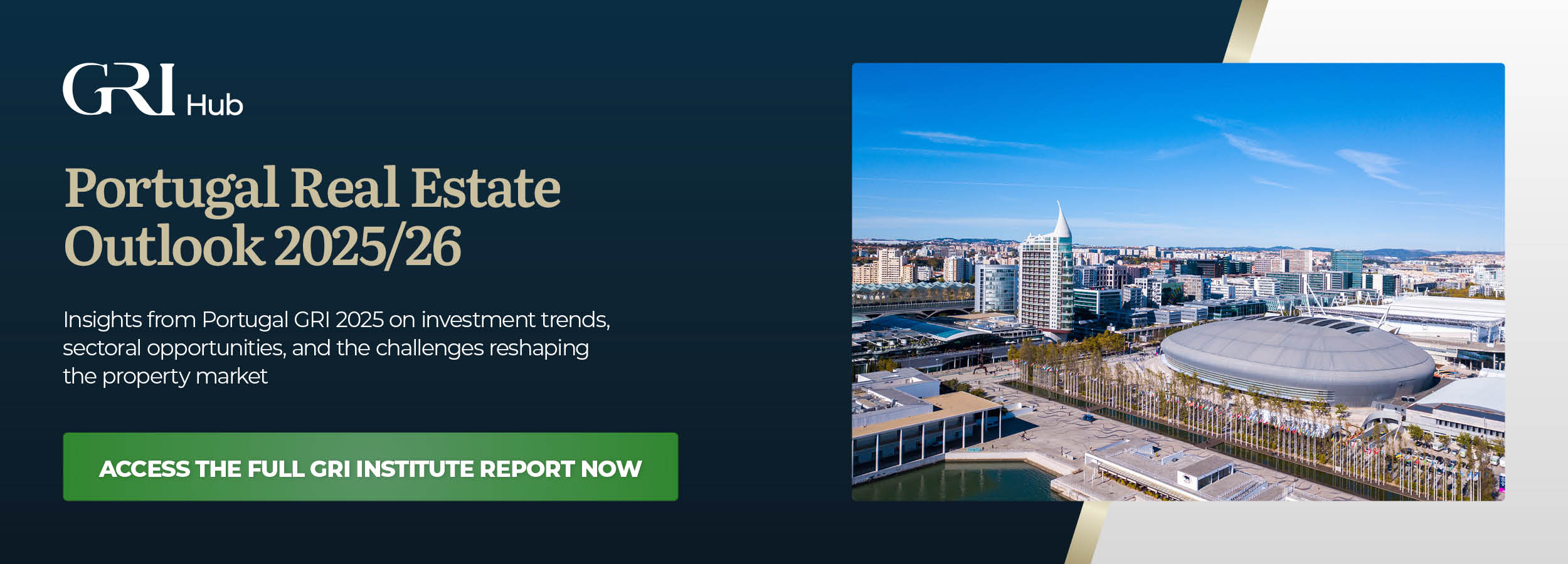 Credit: GRI Institute
Credit: GRI InstitutePortugal’s Property Prospects - GRI Institute Report Reveals Key Takeaways
Insights from Portugal GRI 2025 on investment trends, sectoral opportunities, and the challenges reshaping the property market
August 5, 2025Real Estate
Written by:Rory Hickman
Portugal continues to attract institutional and cross-border investment, but beneath the surface, the real estate market is grappling with deep structural challenges.
From rising construction costs and tightening financing conditions to bureaucratic delays and a mounting housing crisis, investors and developers alike are being pushed to rethink their strategies.
The GRI Institute’s latest report, Portugal Real Estate Outlook 2025/26, explores how Portugal is repositioning itself in an increasingly competitive European market, capturing exclusive insights from the country’s most influential real estate leaders, gathered during our flagship annual Portugal GRI meeting in Lisbon.
Capital is flowing steadily into a wide range of assets in Portugal, particularly in the residential and hospitality sectors, with Lisbon and Porto as the primary hotspots, but investors are also eyeing regeneration and mixed-use projects in secondary cities, including Braga and Faro.
Financing Conditions
Stricter bank lending following Basel IV is pushing developers toward alternative lenders, especially for smaller or riskier projects. ESG (environmental, social, and governance) criteria are playing an increasingly decisive role in securing financing, particularly from international investors.
Residential
Portugal faces a significant housing shortage, especially in Lisbon, with an estimated 30,000-unit shortfall and rising demand driven by immigration. Discussions highlighted Build-to-Rent (BTR), flexible living models, and office-to-residential conversions as potential solutions.
Hospitality
With record tourism figures and a fragmented market, investors are targeting value-add opportunities and seeking to reposition family-owned hotels. Operational efficiency, tech adoption, and partnership alignment between developers and operators are essential to success.
Offices
The shift to hybrid work is reshaping the market, with ESG-certified, flexible, and well-located spaces in high demand. Developers are targeting multi-use buildings in both Lisbon and secondary cities, while facing persistent challenges around licensing and rising construction costs.
Retail
Although retail sales are growing modestly, especially in leisure-oriented shopping centres, mixed-use developments are on the rise. Cost inflation is pushing developers toward refurbishments over new builds, and turnover rent agreements are aligning landlord-tenant interests.
Logistics
E-commerce and international interest are accelerating logistics demand, especially in Lisbon and Porto. Conversations revealed that developers are cautiously exploring speculative and modular warehousing in secondary markets, while technology and automation are becoming core differentiators.
This comprehensive outlook is more than a market overview. It is a candid account of how Portugal’s real estate ecosystem is adapting to risk, regulation, and reinvention - with insights that offer clear direction to those investing in or expanding within the region.
Download the full report below to gain a sharper lens on Portugal’s evolving real estate landscape:

From rising construction costs and tightening financing conditions to bureaucratic delays and a mounting housing crisis, investors and developers alike are being pushed to rethink their strategies.
The GRI Institute’s latest report, Portugal Real Estate Outlook 2025/26, explores how Portugal is repositioning itself in an increasingly competitive European market, capturing exclusive insights from the country’s most influential real estate leaders, gathered during our flagship annual Portugal GRI meeting in Lisbon.
What’s inside the report?
Investment TrendsCapital is flowing steadily into a wide range of assets in Portugal, particularly in the residential and hospitality sectors, with Lisbon and Porto as the primary hotspots, but investors are also eyeing regeneration and mixed-use projects in secondary cities, including Braga and Faro.
Financing Conditions
Stricter bank lending following Basel IV is pushing developers toward alternative lenders, especially for smaller or riskier projects. ESG (environmental, social, and governance) criteria are playing an increasingly decisive role in securing financing, particularly from international investors.
Residential
Portugal faces a significant housing shortage, especially in Lisbon, with an estimated 30,000-unit shortfall and rising demand driven by immigration. Discussions highlighted Build-to-Rent (BTR), flexible living models, and office-to-residential conversions as potential solutions.
Hospitality
With record tourism figures and a fragmented market, investors are targeting value-add opportunities and seeking to reposition family-owned hotels. Operational efficiency, tech adoption, and partnership alignment between developers and operators are essential to success.
Offices
The shift to hybrid work is reshaping the market, with ESG-certified, flexible, and well-located spaces in high demand. Developers are targeting multi-use buildings in both Lisbon and secondary cities, while facing persistent challenges around licensing and rising construction costs.
Retail
Although retail sales are growing modestly, especially in leisure-oriented shopping centres, mixed-use developments are on the rise. Cost inflation is pushing developers toward refurbishments over new builds, and turnover rent agreements are aligning landlord-tenant interests.
Logistics
E-commerce and international interest are accelerating logistics demand, especially in Lisbon and Porto. Conversations revealed that developers are cautiously exploring speculative and modular warehousing in secondary markets, while technology and automation are becoming core differentiators.
This comprehensive outlook is more than a market overview. It is a candid account of how Portugal’s real estate ecosystem is adapting to risk, regulation, and reinvention - with insights that offer clear direction to those investing in or expanding within the region.
Download the full report below to gain a sharper lens on Portugal’s evolving real estate landscape:


